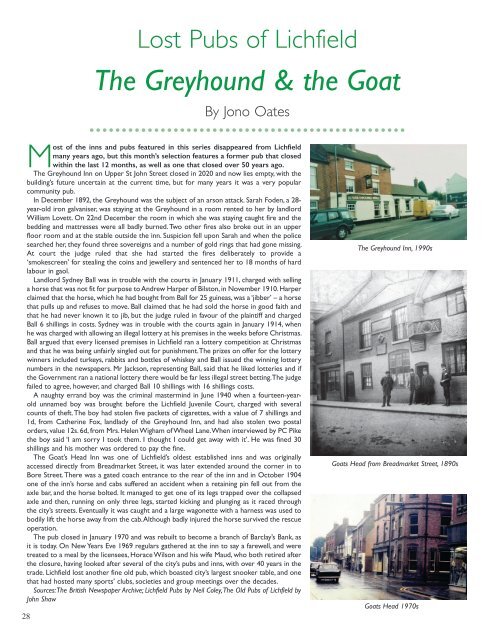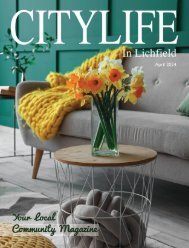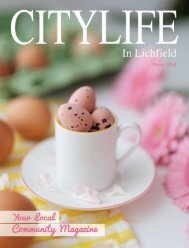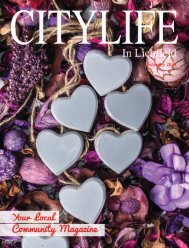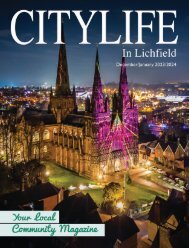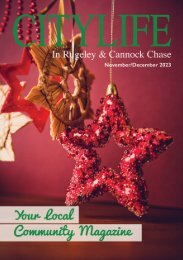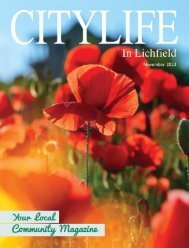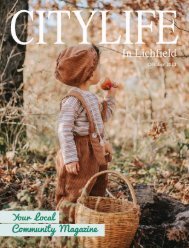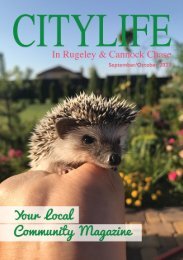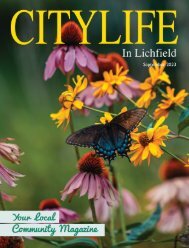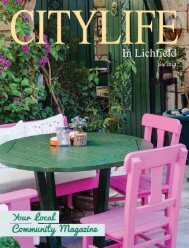Citylife in Lichfield January 2022
It's the New Year and let's hope that 2022 is a better year for all of us! Our January edition magazine is full of our usual mix of local news, history features, competitions, recipes and What's On events as well as some ideas for getting yourself in shape for 2022! We hope you enjoy reading our magazine - and a Happy New Year from everyone at Citylife Magazines!
It's the New Year and let's hope that 2022 is a better year for all of us! Our January edition magazine is full of our usual mix of local news, history features, competitions, recipes and What's On events as well as some ideas for getting yourself in shape for 2022! We hope you enjoy reading our magazine - and a Happy New Year from everyone at Citylife Magazines!
You also want an ePaper? Increase the reach of your titles
YUMPU automatically turns print PDFs into web optimized ePapers that Google loves.
Most of the <strong>in</strong>ns and pubs featured <strong>in</strong> this series disappeared from <strong>Lichfield</strong><br />
many years ago, but this month’s selection features a former pub that closed<br />
with<strong>in</strong> the last 12 months, as well as one that closed over 50 years ago.<br />
The Greyhound Inn on Upper St John Street closed <strong>in</strong> 2020 and now lies empty, with the<br />
build<strong>in</strong>g’s future uncerta<strong>in</strong> at the current time, but for many years it was a very popular<br />
community pub.<br />
In December 1892, the Greyhound was the subject of an arson attack. Sarah Foden, a 28-<br />
year-old iron galvaniser, was stay<strong>in</strong>g at the Greyhound <strong>in</strong> a room rented to her by landlord<br />
William Lovett. On 22nd December the room <strong>in</strong> which she was stay<strong>in</strong>g caught fire and the<br />
bedd<strong>in</strong>g and mattresses were all badly burned. Two other fires also broke out <strong>in</strong> an upper<br />
floor room and at the stable outside the <strong>in</strong>n. Suspicion fell upon Sarah and when the police<br />
searched her, they found three sovereigns and a number of gold r<strong>in</strong>gs that had gone miss<strong>in</strong>g.<br />
At court the judge ruled that she had started the fires deliberately to provide a<br />
‘smokescreen’ for steal<strong>in</strong>g the co<strong>in</strong>s and jewellery and sentenced her to 18 months of hard<br />
labour <strong>in</strong> gaol.<br />
Landlord Sydney Ball was <strong>in</strong> trouble with the courts <strong>in</strong> <strong>January</strong> 1911, charged with sell<strong>in</strong>g<br />
a horse that was not fit for purpose to Andrew Harper of Bilston, <strong>in</strong> November 1910. Harper<br />
claimed that the horse, which he had bought from Ball for 25 gu<strong>in</strong>eas, was a ‘jibber’ – a horse<br />
that pulls up and refuses to move. Ball claimed that he had sold the horse <strong>in</strong> good faith and<br />
that he had never known it to jib, but the judge ruled <strong>in</strong> favour of the pla<strong>in</strong>tiff and charged<br />
Ball 6 shill<strong>in</strong>gs <strong>in</strong> costs. Sydney was <strong>in</strong> trouble with the courts aga<strong>in</strong> <strong>in</strong> <strong>January</strong> 1914, when<br />
he was charged with allow<strong>in</strong>g an illegal lottery at his premises <strong>in</strong> the weeks before Christmas.<br />
Ball argued that every licensed premises <strong>in</strong> <strong>Lichfield</strong> ran a lottery competition at Christmas<br />
and that he was be<strong>in</strong>g unfairly s<strong>in</strong>gled out for punishment. The prizes on offer for the lottery<br />
w<strong>in</strong>ners <strong>in</strong>cluded turkeys, rabbits and bottles of whiskey and Ball issued the w<strong>in</strong>n<strong>in</strong>g lottery<br />
numbers <strong>in</strong> the newspapers. Mr Jackson, represent<strong>in</strong>g Ball, said that he liked lotteries and if<br />
the Government ran a national lottery there would be far less illegal street bett<strong>in</strong>g. The judge<br />
failed to agree, however, and charged Ball 10 shill<strong>in</strong>gs with 16 shill<strong>in</strong>gs costs.<br />
A naughty errand boy was the crim<strong>in</strong>al masterm<strong>in</strong>d <strong>in</strong> June 1940 when a fourteen-yearold<br />
unnamed boy was brought before the <strong>Lichfield</strong> Juvenile Court, charged with several<br />
counts of theft. The boy had stolen five packets of cigarettes, with a value of 7 shill<strong>in</strong>gs and<br />
1d, from Cather<strong>in</strong>e Fox, landlady of the Greyhound Inn, and had also stolen two postal<br />
orders, value 12s. 6d, from Mrs. Helen Wigham of Wheel Lane. When <strong>in</strong>terviewed by PC Pike<br />
the boy said ‘I am sorry I took them. I thought I could get away with it’. He was f<strong>in</strong>ed 30<br />
shill<strong>in</strong>gs and his mother was ordered to pay the f<strong>in</strong>e.<br />
The Goat’s Head Inn was one of <strong>Lichfield</strong>’s oldest established <strong>in</strong>ns and was orig<strong>in</strong>ally<br />
accessed directly from Breadmarket Street, it was later extended around the corner <strong>in</strong> to<br />
Bore Street. There was a gated coach entrance to the rear of the <strong>in</strong>n and <strong>in</strong> October 1904<br />
one of the <strong>in</strong>n’s horse and cabs suffered an accident when a reta<strong>in</strong><strong>in</strong>g p<strong>in</strong> fell out from the<br />
axle bar, and the horse bolted. It managed to get one of its legs trapped over the collapsed<br />
axle and then, runn<strong>in</strong>g on only three legs, started kick<strong>in</strong>g and plung<strong>in</strong>g as it raced through<br />
the city’s streets. Eventually it was caught and a large wagonette with a harness was used to<br />
bodily lift the horse away from the cab. Although badly <strong>in</strong>jured the horse survived the rescue<br />
operation.<br />
The pub closed <strong>in</strong> <strong>January</strong> 1970 and was rebuilt to become a branch of Barclay’s Bank, as<br />
it is today. On New Years Eve 1969 regulars gathered at the <strong>in</strong>n to say a farewell, and were<br />
treated to a meal by the licensees, Horace Wilson and his wife Maud, who both retired after<br />
the closure, hav<strong>in</strong>g looked after several of the city’s pubs and <strong>in</strong>ns, with over 40 years <strong>in</strong> the<br />
trade. <strong>Lichfield</strong> lost another f<strong>in</strong>e old pub, which boasted city’s largest snooker table, and one<br />
that had hosted many sports’ clubs, societies and group meet<strong>in</strong>gs over the decades.<br />
Sources: The British Newspaper Archive; <strong>Lichfield</strong> Pubs by Neil Coley, The Old Pubs of <strong>Lichfield</strong> by<br />
John Shaw<br />
28<br />
Lost Pubs of <strong>Lichfield</strong><br />
The Greyhound & the Goat<br />
By Jono Oates<br />
.................................................<br />
The Greyhound Inn, 1990s<br />
Goats Head from Breadmarket Street, 1890s<br />
Goats Head 1970s


